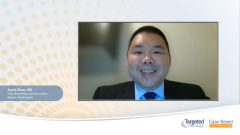
Managing Adverse Events from Immunotherapy in Upper Gastric Cancer
David Zhen, MD, provides clinical insights on the management of adverse events stemming from immunotherapy in patients with upper gastric cancer.
Episodes in this series

Case: A 60-Year-Old Man with Stage IV Gastric Adenocarcinoma
Clinical Presentation:
- A 60-year-old man with abrupt 10-pound weight loss, dyspepsia, bloating after meals, and loss of appetite, and all symptoms worsening over the past three months.
- PMH and FHx: Overweight and HTN. Patients father deceased at age 50 due to gastric cancer.
Initial Clinical Workup and Diagnosis:
- EGD showed 2 cm protruding mass in the body of the stomach
- No Ulcerations
- Biopsy showed poorly differentiated adenocarcinoma
- Stage IV adenocarcinoma
- Molecular Testing: HER2/neu –; MMRp/MSS, PD-L1 CPS 5%
- CT of abdomen and chest reveal a gastric polypoid mass and thickening; No ascites; 2 lesions in the left lower lobe.
- Lung Biopsy: metastatic adenocarcinoma consistent with gastric primary
- PET/CT confirmed metastatic disease
Current Treatments:
- Patient was initiated on FOLFOX +nivolumab
This is a video synopsis/summary of a Case-Based Peer Perspectives series featuring David Zhen, MD.
When using a combination of chemotherapy and immunotherapy to treat metastatic gastric cancer, clinicians must be aware of potential toxicities associated with both treatment modalities. While chemotherapy toxicities are generally well managed, immunotherapy toxicities require heightened attention. The main concern with immunotherapy is the risk of inflammation in any organ, often referred to as “-itis" conditions, such as thyroiditis, pneumonitis, or colitis.
Zhen emphasizes the importance of considering immunotherapy-related toxicities when patients present with symptoms, even if they may be attributed to other causes. For example, if a patient experiences breathing issues, it is crucial to rule out pneumonia or aspiration before considering the possibility of pneumonitis. Early recognition and appropriate management of immunotherapy toxicities are essential to prevent serious complications.
If mild toxicities occur, observation may be sufficient. However, for grade 2 or 3 toxicities, immunotherapy should be held and steroids promptly initiated. With early recognition and appropriate management, patients often recover without experiencing severe immunotherapy-related toxicities.
Video synopsis is AI-generated and reviewed by Targeted Oncology™ editorial staff.










































